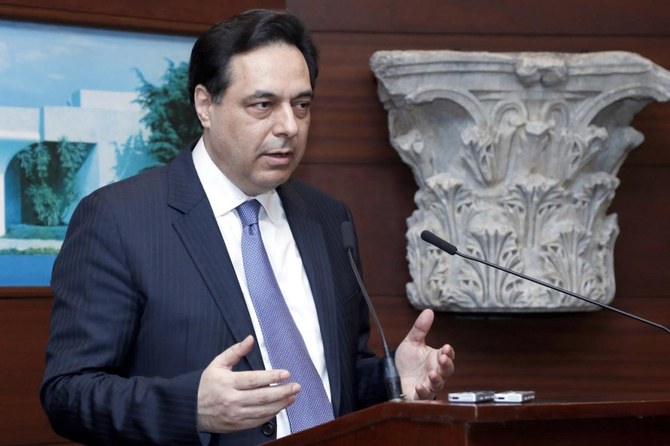BEIRUT: A subpoena for Lebanon’s caretaker prime minister was issued on Thursday after he failed to show up for questioning in a growing case surrounding last year’s Beirut blast.
Tarek Bitar, a Lebanese judge leading the probe into last year’s explosion at Beirut’s port, made the decision after weeks of delay by Hassan Diab.
Last month, Bitar confirmed charges filed by his predecessor against Diab and three former ministers.
Security forces have been ordered to bring in Diab by force, 24 hours before the date of the next questioning session, which Bitar set for Sept. 20.
A judicial source told Arab News: “This step will be followed by similar ones. Judge Bitar may issue similar subpoenas, based on Article 106 of the Code of Criminal Procedures, against other defendants, including former ministers and security officials.”
Bitar and judicial investigator Fadi Sawan — who handled the case before him — charged former ministers and current MPs in addition to Diab, namely Ali Hassan Khalil, Ghazi Zeaiter, Nohad Machnouk and former minister Youssef Fenianos.
Hundreds of tons of ammonium nitrate, a highly explosive material used in fertilizers that had been improperly stored in the port for years, exploded on Aug. 4 last year, killing 215 people, injuring more than 6,500 and devastating nearby neighborhoods.
“The failure of the political class to facilitate Bitar’s judicial work in a crime that took place a year and three weeks ago without accountability is the reason for him to take this path in order to reach the truth,” the judicial source added.
On Wednesday, Bitar simulated the circumstances that preceded the explosion, which occurred after a gap was welded in the structure of a warehouse in which the ammonium nitrate was stored.
The simulation was attended by several lawyers representing the concerned parties, a joint committee of army officers and the Information Division of the Internal Security Forces, while members of the Civil Defense supervised field preparations.
The Lebanese Meteorological Department was also present to link the simulation with climatic conditions on the day of the explosion.
The simulation took four to five hours and was documented without a media presence.
A detailed reenactment of the welding was carried out to verify whether it had a direct effect in causing the fire that preceded the explosion.
A model similar to the original warehouse was constructed for the purposes of the simulation, just meters away from the hole created by the explosion.
Bitar assigned technical experts to draw up a report showing whether the welding caused the explosion after investigators previously ruled out the potential of an aerial bombardment.
He is expected to issue an indictment at the end of the year.
Meanwhile, Bitar is struggling with a lack of harmony with the Public Prosecution in the Beirut blast probe.
In December 2020, Public Prosecutor Judge Ghassan Oweidat stopped pursuing the investigation as a judicial prosecutor in the case because he is related to MP Ghazi Zeaiter, who was later charged.
The families of fire brigade members who died in the blast have also met Bitar. William Noun, whose brother Joe was one of the victims, said: “The families of all the victims will take action next week and organize a sit-in in front of the Justice Palace in Beirut to support the investigation’s progress. History will prove that politicians are failures.”
Meanwhile, three people have been charged for the Aug. 15 explosion of a fuel tank that killed 31 people in the town of Al-Tleil in the Akkar region.
Military Court Judge Fadi Akiki accused detainees George Rashid Ibrahim and Ali Sobhi Faraj of “unsafely storing flammable materials, despite their knowledge of the danger they pose to the lives of citizens, and causing the death of 31 soldiers and civilians.” He charged another detainee Jerji Elias Ibrahim with “setting the fire with a lighter.”


















